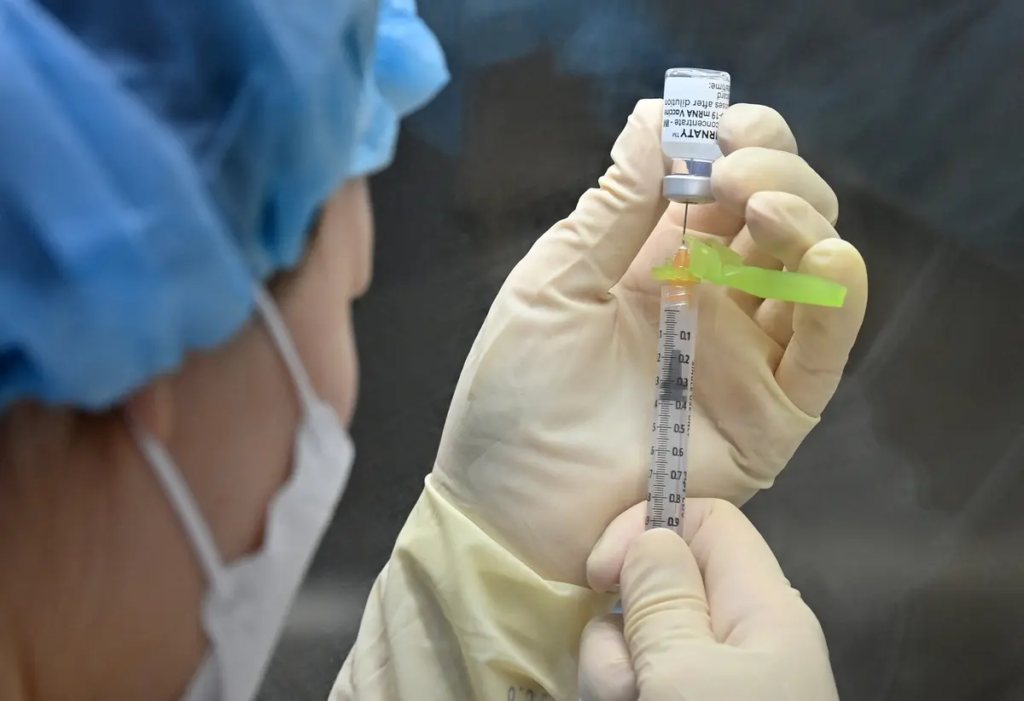
People who received COVID-19 vaccines at higher risk of a range of conditions, South Korean researchers find.
By Zachary Stieber

People who received a COVID-19 vaccine were more likely to suffer a range of conditions, including a lack of blood cells being produced and ear disease, according to new studies.
Researchers in South Korea analyzed data from the Korean National Health Insurance Service to examine whether vaccinated or unvaccinated people had experienced higher rates of dozens of adverse events, including menstrual disorder, ear disease, and aplastic anemia.
They found that vaccination increased the risk of many of the adverse events or health conditions.
In one study, for instance, they found that the incidence rates of 13 immune-related nonfatal adverse events (irAEs) were higher among the vaccinated. The nonfatal problems included menstrual disorder, bruising, tinnitus, inner ear disease, middle ear disease, and other ear disease.
“Vaccination significantly increased the risks of non-fatal irAEs,” Dr. Eun Mi Chun, with Ewha Womans University’s School of Medicine, and the co-authors wrote.
The researchers looked at records from people aged 20 and up. People were counted as vaccinated if they received their second dose or completed a primary series before Sept. 30, 2021. People were counted as unvaccinated if they received no doses. People were excluded if they received one dose or had any of the conditions already.
The vaccinated group included 1.4 million people, compared to 289,576 in the unvaccinated group. The latter skewed younger, with fewer comorbidities, one factor that potentially affected the results.
Researchers measured cumulative incidence rates of the adverse events, which were picked because the doctors felt that nonfatal immune-related problems after COVID-19 vaccination “have yet to be comprehensively elucidated.”
The rates were measured by examining diagnoses among the two cohorts.
Three months after vaccination, the cumulative incidence per 10,000 was higher for all but one of the problems, visual impairment, in the vaccinated group. The problems included glaucoma or vision loss, warts, herpes zoster, and alopecia, which causes hair loss.
Some previous studies have found links between vaccination and some of the issues.
The researchers said the study findings suggest that doctors should observe patients after administering a shot.
“The findings of this study suggest that clinicians should maintain closed observation of a range of nonfatal irAEs after vaccination, given that these manifestations might emerge post-vaccination,” they said.
The paper was published ahead of peer review on the medRxiv server.
In another study that also examined records from the Korean National Health Insurance Service and was released ahead of peer review, Dr. Chun and other researchers found that the vaccinated were more likely to suffer blood disorders and other hematologic abnormalities, including aplastic anemia, a rare condition that sees a person’s body unable to produce enough new blood cells.
“The analyzed data showed that nutritional anemia, aplastic anemia, and coagulation defects increased after COVID-19 vaccination,” the researchers wrote.
A third preprint paper from the researchers outlined the results of examining the incidence of inflammatory musculoskeletal disorders among the vaccinated and unvaccinated. The researchers found that a range of conditions, including plantar fasciitis, bursitis, and Achilles tendinitis, were higher among the vaccinated, regardless of which vaccine the people received.
“Individuals who received COVID-19 vaccines, either mRNA, viral vector, or mixing and 277 matching, were found to be more likely to be diagnosed with inflammatory musculoskeletal 278 disorders compared to those who did not,” the researchers said.
Dr. Chun and the other researchers reported no conflicts of interest and no funding.
Dr. Chun did not respond to emailed questions, including whether the papers have been submitted to journals for peer review.
Manufacturers of the COVID-19 vaccines administered in South Korea, including Pfizer, did not return inquiries.
The COVID-19 vaccines have a number of confirmed side effects, including myocarditis, a form of heart inflammation. The inflammatory conditions recorded at higher rates among the vaccinated may stem from the spike protein in the shots, the South Korean researchers said, while the ear diseases could be caused by the immune response to the spike protein.
Dr. Meryl Nass, an American doctor who was not involved in the research, said that the Bradford Hill criteria, or a set of viewpoints that can be used when trying to determine whether there is a link between a drug and an adverse event, should be considered when reviewing the studies.
One criterion is that the more consistent a link is, the more likely it is causal. “In this case, the various types of illnesses in different organ systems suggest a consistent toxic effect from the vaccines,” Dr. Nass told The Epoch Times via email.
Another is plausibility. “Given the autopsy findings and the side effects attributed to other vaccines and the known physiological mechanisms of the vaccines’ toxicity, plausibility exists,” Dr. Nass said. Various autopsies have determined the vaccines, or conditions they cause, caused deaths.
Other criteria include temporality, or conditions happening soon after vaccination, and biological gradient, or additional doses increasing the incidence of an event. Temporality was found in the new research, while other researchers have found evidence of the gradient.
